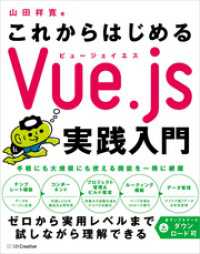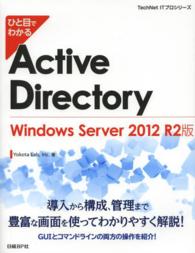- ホーム
- > 洋書
- > 英文書
- > Nature / Ecology
Full Description
Humans generate millions of tons of waste every day. This waste is rich in water, nutrients, energy and organic compounds. Yet waste is not being managed in a way that permits us to derive value from its reuse, whilst millions of farmers struggle with depleted soils and lack of water. This book shows how Resource Recovery and Reuse (RRR) could create livelihoods, enhance food security, support green economies, reduce waste and contribute to cost recovery in the sanitation chain.
While many RRR projects fully depend on subsidies and hardly survive their pilot phase, hopeful signs of viable approaches to RRR are emerging around the globe including low- and middle-income countries. These enterprises or projects are tapping into entrepreneurial initiatives and public ̶ private partnerships, leveraging private capital to help realize commercial or social value, shifting the focus from treatment for waste disposal to treatment of waste as a valuable resource for safe reuse.
The book provides a compendium of business options for energy, nutrients and water recovery via 24 innovative business models based on an in-depth analysis of over 60 empirical cases, of which 47 from around the world are described and evaluated in a systematic way. The focus is on organic municipal, agro-industrial and food waste, including fecal sludge, supporting a diverse range of business models with potential for large-scale out-and up-scaling.
Contents
Foreword Part I Business models for a circular economy: Introduction 1. Business Models for a Circular Economy: Linking Waste Management and Sanitation with Agriculture 2. Defining and Analysing RRR Business Cases and Models Part II Energy Recovery from Organic Waste 3. Business Models on Solid Fuel Production from Waste 4. Business Models for in-house Biogas Production for Energy Savings 5: Business Models for Sustainable and Renewable Power Generation 6. Business Models on Emerging Technologies/Bio-fuel Production from Agro-Waste Part III Nutrient and Organic Matter Recovery 7. Business Models on Partially Subsidized Composting at District Level 8. Business Models on Subsidy-Free Community Based Composting 9. Business Models on Large-Scale Composting for Revenue Generation 10. Business Models on Nutrient Recovery from own Agro-Industrial Waste 11. Business Models on Compost Production for Sustainable Sanitation Service Delivery 12. Business Models for Outsourcing Fecal Sludge Treatment to the Farm 13. Business Models on Phosphorus recovery from Excreta and Wastewater Part IV Wastewater for Agriculture, Forestry and Aquaculture 14. Business Models on institutional and regulatory pathways to cost recovery 15. Business Models beyond Cost Recovery 16. Business Models for Cost sharing and Risk Minimization 17. Business Models on Rural-Urban Water Trading 18. Business Models for increasing Safety in Informal Wastewater Irrigation 19. The Enabling Environment and Finance of Resource Recovery and Reuse Frugal Innovations for the Circular Economy - An Epilogue








